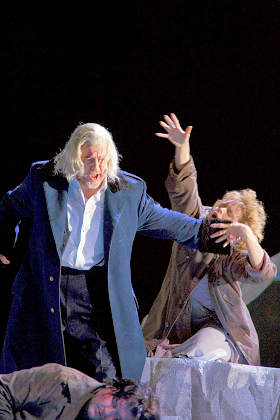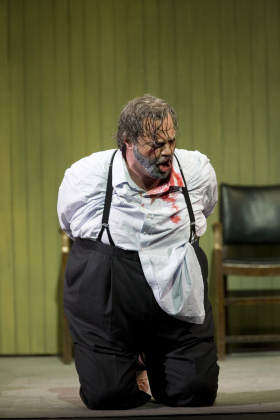|
Editor:
Marc Bridle
Webmaster: Len Mullenger
|
Seen and Heard Opera Review
Set Designs: Christian Fenouillat Costumes: Agostina Cavalca Lighting: Christophe Forey Choreographer: Caroline Lamb Chorus Master: Donald Nally
Cast:
Mazepa - Robert Hayward Kochubei - Gidon Saks Lyubov Kochubei - Marianna Tarasova Mariya - Tatiana Monogarova Andrei - Hugh Smith Orlik - Jonathan May Iskra - Luis Rodriguez Drunken Cossack - Philip Lloyd Holtam
Andrei (Hugh Smith)
WNO was buoyed up recently by winning the Royal Philharmonic Society's Award for Opera and Music Theatre with the 2005 production of Wozzeck (review.) They have very good reason to celebrate again with this new Mazepa, which - to use a hackneyed phrase - really is 'world class opera.' With sensational singing from both chorus and soloists and with marvelous playing from the orchestra, it makes a perfect welcome for John Fisher, the company's new General Director.
Tchaikovsky's second Pushkin opera is relentlessly grim. Politics, double-dealing, torture, and war are its central themes which conspire to corrupt the real love story between the elderly Mazepa and young Mariya Kochubei, plunging her finally into madness. Set in Peter the Great's Russia, it's the story of Ukraine's struggle for independence based on Pushkin's poem Poltava which describes real characters and events.
To point up contemporary relevance as they did in the 2004/5 Traviata, directors Caurier and Leiser stage the work in modern dress. A party in the well-heeled Kochubei's home turns sour when the ageing guest of honour, Mazepa (Hetman or Leader) of Ukraine asks Kochubei for his daughter's hand in marriage - initially for political purposes. When Kochubei refuses consent, Mazepa threatens him, and Mariya who is already 'bewitched' by Mazepa leaves her family willingly. The Kochubeis swear revenge and the hapless Andrei (a young man genuinely love with Mariya) volunteers to alert the Czar to Mazepa's plans for a war of independence.
When the Czar refuses to believe Andrei's
accusations, Kochubei is captured and tortured by Mazepa
and eventually is executed. With some regret, Mazepa finds
that his marriage of convenience to Mariya has blossomed
into love, but political ambition still stands in its
way. Unaware that her father is in Mazepa's power until
her mother begs her to plead for Kochubei's life, the
horror of the situation drives Mariya into madness.
This is a wonderful score, expertly directed by Alexander Polianichko and full of lyrical numbers despite the forbidding plot. Each act has a well-crafted prelude, a brilliant overture for Act I, something darker for Act II and a symphonic poem, 'The Battle of Poltava' for the last act complete with the 'Slava' theme used by Mussorgsky in Boris and some quotations from the 1812 overture. While there is no direct equivalent of the Letter Scene in Onegin, a leitmotiv-like structure runs through the work providing a continuously fine mix of sensitivity and drama, with some especially effective writing for the chorus.
The soloists are all superb (there is no other word) and provide uniformly excellent singing throughout the whole piece. As well as the expected standards from Robert Hayward and Gidon Saks, there are equally strong performances from Marianna Tarasova (Lyubov) and from Tatiana Monogarova (Mariya). American tenor Hugh Smith is also particularly convincing and makes easy work of Andrei's demanding music.
The production is repeated in Cardiff on May 27th and is then on tour. Do go to see it if you possibly can.
Bill Kenny
Photographs © Bill Cooper
WNO Web site: www.wno.org.uk
Back to the Top Back to the Index Page |
| ||
|
||||




